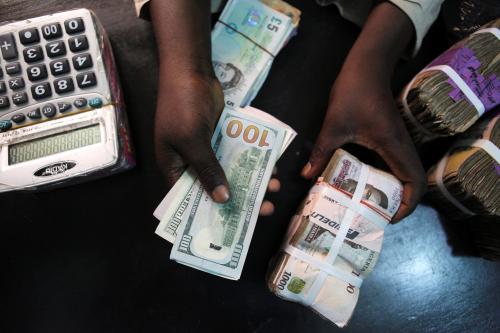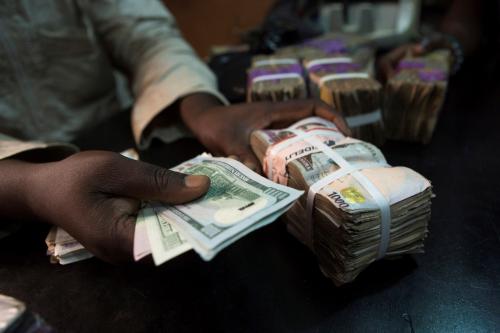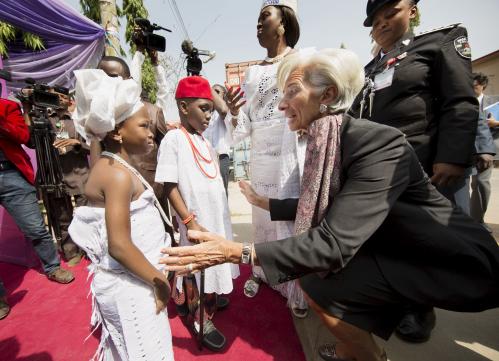J.P. Morgan removes Nigeria from emerging market bond index
On Tuesday, multinational financial institution J.P. Morgan announced that by the end of October it would remove Nigerian bond listings from its Government Bond Index-Emerging Markets Index (GBI-EM) due to the country’s currency restrictions and liquidity issues. The announcement has already provoked some adverse effects in the country’s capital and currency markets, and, according to Bloomberg, Nigeria’s expulsion from the index could lead to mass outflows of capital and increase borrowing costs for the Nigerian government.
Nigeria was incorporated into the GBI-EM in 2012 after its central bank removed foreign investment controls to help curb mounting inflation and currency volatility. As a result, investor sentiment improved and foreign portfolio investment flows jumped from 808 billion naira in 2012 to 1.5 trillion naira in 2014. However, more recently, the central bank reintroduced controls on currency trading to stabilize the naira, as it depreciated to new lows in 2015. J.P. Morgan issued warnings to the Nigerian government to find alternative measures to improve its currency market’s liquidity without increasing currency controls, which were “making transactions too complicated” for foreign investors using the index, according to Vanguard.
In response to J.P. Morgan’s announcement, the Finance Ministry, Central Bank, and Debt Management Office of Nigeria issued a public statement disagreeing with J.P. Morgan’s decision. These institutions argued that reducing the currency controls “would lead to an indeterminate depreciation of the Naira” and that the federal government will “only continue to take economic decisions that will impact positively in the lives of all Nigerians.”
IMF Managing Director assesses path forward for Liberian Ebola recovery
International Monetary Fund (IMF) managing director Christine Lagarde arrived in Monrovia on Thursday for a two-day visit to Liberia. Madame Lagarde’s travel to the country aims to allow the IMF to better understand Liberia’s progress toward recovering from the Ebola epidemic, which resulted in the death of over 4,800 Liberian citizens. The World Health Organization officially declared the country free of the virus last week, entering a 90-day period of monitoring for new cases. Madame Largarde’s visit is the first time a managing director has travelled to Liberia, and her delegation includes high-level IMF representatives, including Antoinette Sayeh, the director of the Fund’s African department and Liberia’s finance minister from 2006 to 2008. Since the outbreak of Ebola in Liberia, the IMF has provided the country with significant support, including a $130 million package of financing and debt relief, offered under a new trust established to support countries struggling to contain the virus. Under these terms, the IMF will not require Liberia to make payments on its current loans until 2018. Madame Lagarde’s visit to Liberia will include meetings with President Ellen Johnson-Sirleaf, Liberian civil society groups, the private sector, and an address at the Monrovia City Hall.
ICT developments in East Africa
Ministers of Information and Communication Technologies (ICT) met at the headquarters of the African Union (AU) in Ethiopia last week to approve projects and harmonize frameworks for the implementation of the AU Agenda 2063 and the development Africa’s growth trajectory through enhancement of ICT. The meeting was the first of its kind organized by the Department of Infrastructure and Energy and the Directorate of Information and Communication of the AU Commission, marking the start of a “new era for information society in Africa.”
The ICT sector in Africa is certainly booming: sub-Saharan Africa has been the region with the fastest-growing mobile sector over the last five years in terms of both unique subscribers and connections. In a recently released report by Facebook, which stated that 100 percent of its monthly users in Nigeria and South Africa are on mobile phones, Facebook reported that Africa indeed is a “mobile continent.” Keeping up the efforts to enhance communication and information flows, construction of the Kenya and South Sudan high-speed fiber optic cable as part of the Eastern Africa Regional Transport, Trade and Development Facilitation Project commenced this week. The project is expected to help ease communication in the region, ensure that South Sudan also benefits from the ongoing development of East Africa’s communication infrastructure, and, in conjunction with a road construction project, facilitate trade between Kenya and South Sudan.






Commentary
Africa in the news: J.P. Morgan expels Nigeria from bond index, IMF chief Lagarde visits Liberia, and ICT project takes off in East Africa
September 11, 2015